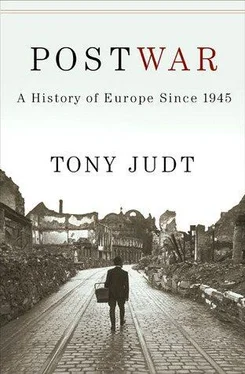It was no coincidence that Soviet advisers were withdrawn from Yugoslavia on March 18th 1948, just forty-eight hours before General Sokolovski walked out of the Allied Control Council meeting in Germany.
Had he wished to do so, there was little practical impediment. In the spring of 1948 the Soviet Union had three hundred divisions within reach of Berlin. The US had only 60,000 soldiers in all of Europe, fewer than 7,000 of them in Berlin.
The Basic Law was deliberately provisional —‘to give a new order to political life for a transitional period’: i.e. until the country was reunited.
The French Finance Minister Henri Queuille complained to the US Ambassador to France of Britain’s ‘complete lack of loyalty.’
A point of view nicely captured in lines anonymously penned during the negotiations on Britain’s postwar loan:
‘In Washington Lord Halifax
Once whispered to Lord Keynes:
“It’s true they have the moneybags
But we have all the brains.”’
Germans understandably did not remember the war in this light and would be mystified in decades to come when subjected to English football supporters’ chants and British tabloid newspaper headlines referring to ‘Huns’, ‘Krauts’ and the like.
Professor Kenneth Jowett of UC Berkeley.
The institutions of the German Democratic Republic were somewhat distinct, reflecting its interim standing in Soviet eyes. But the spirit of its laws and practices was impeccably orthodox.
The Baltic states, fully incorporated into the Soviet Union itself, were even worse off than the rest of eastern Europe. In 1949 kolkhozes in northern Estonia were required to begin grain deliveries even before the harvest had begun, in order to keep in line with Latvia, four hundred kilometers to the south. By 1953 rural conditions in hitherto prosperous Estonia had deteriorated to the point where cows blown over by the wind were too weak to get back on their feet unaided.
The initial Comecon participants were Bulgaria, Czechoslovakia, Hungary, Poland, Romania and the USSR, joined shortly thereafter by Albania and the GDR. In later years Yugoslavia, Mongolia, China, North Korea and North Vietnam also became members. In 1963 Comecon countries’ share of international trade was 12 percent; by 1979 it was 9 percent and falling.
Under the 1946 Constitution the constituent republics—Serbia, Croatia, Slovenia, Bosnia, Macedonia and Montenegro—were free to secede from the Federation, a right of which they were deprived seven years later.
It is significant that Stalin left his nuclear physicists alone and never presumed to second guess their calculations. Stalin may well have been mad, but he was not stupid.
They were executed nonetheless. Three weeks after his death, the regime published Petkov’s posthumous ‘confession’. But this was so obviously faked that it rapidly became an embarrassment, even in Communist Bulgaria. The authorities ceased to speak of it and the Bulgarian secret police chief who had injudiciously arranged for its publication was duly shot.
As late as 1966, four-fifths of Polish state employees had only a primary school education. The country was run by a strikingly under-educated administrative caste.
In 1924 the 27-year-old Kostov was arrested and tortured by the Bulgarian police. Afraid that he might betray the (underground) Communists he leaped from a fourth-floor window at police headquarters in Sofia and broke both his legs.
The Bund was a Jewish labor movement whose roots lay in pre-war czarist Russia and whose interwar activities were confined to Poland.
See Heda Margolius Kovaly, Under a Cruel Star (1986). In the eighteen months following the end of World War Two more Jews were killed in Poland, Hungary and Czechoslovakia than in the ten years preceding the war.
Stalin’s Secret Pogrom: The Postwar Inquisition of the Jewish Anti-Fascist Committee (Yale University Press, 2002), edited by Joshua Rubenstein and Vladimir Naumov, page 52. Following a familiar pattern, Komarov himself would later be imprisoned and executed—pleading to the last his anti-Semitic credentials.
The survivors were all released in later years, though they and their fellow victims would not be fully rehabilitated and exonerated until 1968.
The script was very precise. When André Marty was unofficially ‘tried’ by the Central Committee of the French Communist Party in December 1952, his ‘prosecutor’, Léon Mauvais, accused him of speaking of ‘the Trotskyist International’ rather than ‘Trotskyist scum’ or ‘group of Trotskyist police spies’, which were the Communists’ ‘natural and habitual’ terms for use when referring to Trotskyists. This linguistic slippage alone placed Marty under grave suspicion.
Catherine Merridale, Night of Stone: Death and Memory in 20th-Century Russia (2000), page 249.
Translation by Professor Marci Shore of Indiana University, slightly amended by TJ. I am also indebted to Professor Shore for the quotation from Ludek Pachman.
Zdeněk Mlynář, Night Frost in Prague (London, 1980), page 2.
Brecht, characteristically, hedged his bets by retaining an Austrian passport.
The best-known of course was Arthur Koestler—but then he might as readily be described as Hungarian, or Austrian, or French or Jewish.
The PSI in these years was unique among West European Socialist parties in its proximity and subordination to the Communists—a pattern much more familiar in Eastern Europe.
In De Sica’s Sciuscià (made in 1946 and set in that same year) the director of a boys’ prison not only gives the Fascist salute—a habit he cannot break—but alludes with undisguised nostalgia to the low crime figures back in Mussolini’s time.
Despite his own misgivings about Soviet cultural policy, Paul Eluard refused to criticize Zdanovism in front of the working-class comrades of his local Party cell. As he explained to Claude Roy, ‘Poor things, it would just discourage them. One must not upset those taking part in the struggle; they wouldn’t understand.’
François Fejtö, living in Paris, noted some years later that whereas the Italian Communists gave a warm, if guarded, welcome to his history of Eastern Europe, the PCF condemned it as the work of just another renegade.
Thus Emmanuel Mounier, in Esprit , February 1946: ‘Anti-Communism… is the necessary and sufficient crystallizing force for a return of Fascism.’
Likewise, the cult of Mao in the West reached its zenith at the height of the Cultural Revolution, just when and just because Mao was persecuting writers, artists and teachers.
In these years ‘progressivism’, as Raymond Aron mordantly observed, consisted in ‘presenting Communist arguments as though they emanated spontaneously from independent speculation.’
Читать дальше












